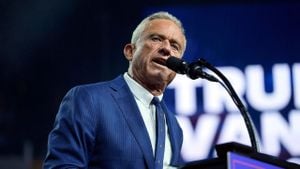At the much-anticipated opening ceremony of COP29, Azerbaijan’s President Ilham Aliyev delivered remarks reflecting his nation’s controversial stance on fossil fuels, describing oil and gas as a “gift from God.” This statement not only sparked applause from some quarters but also ignited pushback from environmental advocates and global leaders concerned about climate change.
Speaking to delegates gathered for the United Nations climate summit held in Baku on November 12, Aliyev used his platform to highlight Azerbaijan's natural resources, dismissing criticism from the West. He accused Western media, NGOs, and certain political figures of what he termed as “slander and blackmail” aimed at undermining his country’s oil and gas extraction practices.
“Countries should not be blamed for having oil and gas,” Aliyev stated, emphasizing the importance of bringing these resources to market because “the market needs them.” His rhetoric hinted at the complexity of balancing economic reliance on fossil fuels with the pressing global call for renewable energy.
Contrasting sharply with Aliyev’s views, UN Secretary-General António Guterres cautioned against the continued dependence on fossil fuels, declaring it “absurd” amid the backdrop of intensifying climate disasters worldwide. Guterres noted the recent projections indicating 2024 is likely to become the hottest year on record, urging nations to reconsider their commitments to fossil fuel production.
Aliyev’s remarks also revisited longstanding tensions with Armenia, as he took the opportunity to express grievances about what he perceives as Armenia’s continued occupation of Azerbaijani territory. He claimed international forces had failed to address these issues adequately, pointing to resolutions he stated had gone unheeded for decades until Azerbaijan’s “victory” during the 2020 Artsakh War.
During his address, Aliyev surprisingly referred back to previous statements, repeating, “This is a gift of God,” reiteratively stating his pride and reliance on Azerbaijan's fossil fuel resources. This steadfast commitment raises eyebrows among critics who assert the need for urgent action against climate change.
Aliyev's enthusiastic endorsement of fossil fuels and dismissal of contemporary environmental challenges is especially provocative, especially coming after public outcry from several environmental organizations calling for reducing reliance on fossil energy. Environmentalists argue these resources contribute significantly to global warming and climate instability.
Despite the applause from some corners—particularly from states heavily invested in fossil fuels, like Saudi Arabia—many environmentalists have voiced discontent. They argue such statements undermine the spirit and goals of the COP negotiations aimed at fostering sustainable energy solutions for future generations.
Prior to the event, allegations circulated concerning Azerbaijan’s behind-the-scenes dealings related to its gas resources. Reports indicated high-ranking officials were potentially engaged with foreign entities to discuss opportunities for investment within the oil and gas sector, raising questions about the sincerity of the country’s commitment to transitioning to greener energy practices.
The criticism directed at Aliyev is not merely confined to his remarks about fossil fuels. Various human rights organizations have reported crackdowns on journalists and activists leading up to the climate summit, which they argue paints Azerbaijan's image with hypocrisy as the country attempts to position itself as both an energy leader and climate change participant.
These reports claim at least eleven journalists have faced extended detentions under allegations of smuggling related to purported funding from Western sources. Such actions have drawn condemnation from advocates for free speech worldwide, who argue these are attempts to silence dissenting voices at such pivotal gatherings.
The COP29 summit, hosted by Azerbaijan amid controversy surrounding its fossil fuel-dependent economy, highlights the complex relationship many countries share with energy resources. While Azerbaijan profits greatly from oil and gas—accounting for 35% of its GDP and nearly half the state budget—questions linger about the country’s future steps toward energy diversification.
The energy dependency of Azerbaijan could provide it with strategic advantages, especially as Europe seeks alternatives to Russian gas. Recent agreements aimed to double gas imports from Azerbaijan to bolster European energy security have placed the country at the heart of geopolitical discussions.
Yet, critics insist it is imperative for nations to pivot toward renewable resources—not merely for environmental health but for the overall sustainability of the planet. They contend, aside from economic benefits, the long-term impacts of continued fossil fuel reliance might outstrip any immediate gains.
Aliyev's declarations of fossil fuel pride juxtaposed sharply against Guterres's warnings highlight the contentious discussions surrounding COP29. The event's efficacy is already being questioned, as some global leaders chose to absent themselves, casting doubts on the seriousness of commitments amid rising global temperatures.
With significant figures, including President Joe Biden and other world leaders' absence from COP29, the summit faces skepticism about achieving substantial progress and international cooperation for climate action. The contrasting dialogue encapsulated by Aliyev and Guterres serves as a microcosm of larger debates around climate change, economic strategies, and the future of global energy use.
Aliyev’s invocation of “God’s gift” framing could become emblematic of the struggle between traditional resource dependence versus modern sustainability needs—making COP29 not merely about climate action, but about defining the future scope of energy partnership across the globe.
Interestingly, the discussions along the Baku conference halls serve not only as the meeting place for climate negotiations but as the battleground for ideological differences about how to approach global challenges, such as climate change. Aliyev's remarks will likely continue to resonate, stirring debates about fossil fuels' role and the urgent call for sustainable energy advancements.



